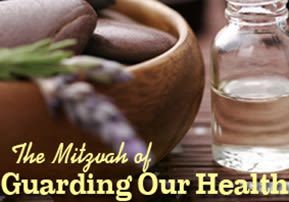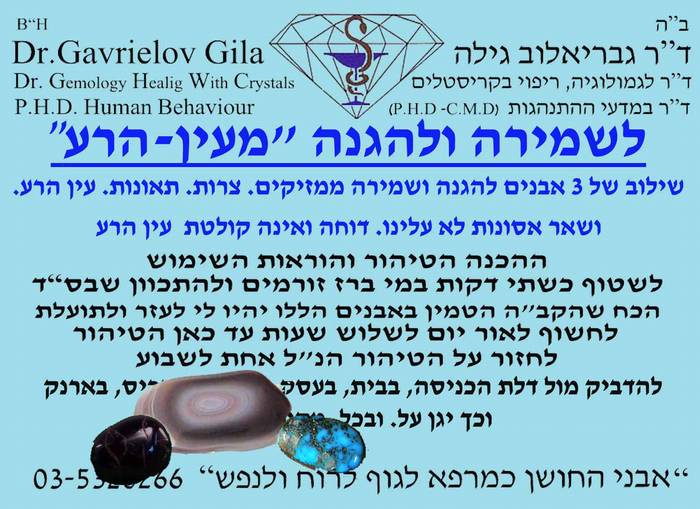
Guarding Our Health
Many people have long neglected the laws pertaining to health, which probably explains why there’s so much disease and flabbiness among those with modern-day lifestyles.

Rambam’s Laws on Nutrition and Health, Part 1
Most people think that the Jewish laws concerning eating consist mainly of the extensive and complex dietary laws of kosher and non-kosher foods. In strict orthodox circles, it is much less known that mainstream halacha has clear guidelines concerning wholesome lifestyles with special emphasis on developing healthy eating habits for the sake of cultivating optimal health. Many orthodox Jews, who strive to keep halacha scrupulously, follow a most unhealthy lifestyle eating white potatoes, white bread and white sugar cookies made with hydrogenated oil, they may drink soda and Coca-Cola, and some even smoke.
Perhaps the halachot pertaining to nutrition and health have been neglected, compared to the rest of the body of halacha, because due to our long-winding exile we have become estranged not only from our land, but even from our own body. Our two thousand year exile caused by the lack of unity among the Jewish people deepened the rifts between us, and intensified the dichotomies of the world to the extent that the original harmony between body and soul was torn apart. There is a direct correlation between our body and our land, which in reality is its extension. Just like most Jews have forgotten how to live in harmony with our Holy Land, we have also become disconnected from our physical body. Just like Jews in Biblical time used to be farmers and sheepherders, we have reason to believe that they led completely wholesome lifestyles, never ingesting junk-foods or overeating but chewing their foods very carefully for optimal digestion.
In recent time, since Jewish sovereignty has returned to part of the land of Israel, and we are drawing closer to the final geula (redemption), there has been renewed interest in body awareness, wholesome diet an developing healthy lifestyles. Before we take guidance from all the numerous alternative health approaches available in the world today, it makes sense to turn to the wisdom of the Torah and explore our own sources regarding nutrition and health. One of the main classical Torah teachers on the wisdom of preserving our health is the Rambam, a most significant halachic authority in all Jewish history. In addition to being the most illustrious learned Rabbi not only of his own time, but for all subsequent time periods of Jewish Rabbinical history, he also served as the main physician to the Sultan in Egypt for many decades. Rambam’s Mishneh Torah was the first systematic code of Jewish law ever written, which summarized Talmudic law and organized it into topical categories. This code is a cornerstone of all later halachic writings, and whole fields of yeshivah learning revolve around it.
Religious Obligation
In the writings of the Rambam, healthy dietary habits are part and parcel of the religious obligation to serve Hashem through everything we do in life:
A person must direct his heart and all his deeds to know Hashem blessed be He alone. His sitting, rising, and speaking all should be towards this matter. How is that? When he does business or paid work, his heart shouldn’t only care about making money, but he should rather do these things in order to provide the things which the body needs through eating, drinking, setting up a home, and marrying a woman. Likewise when he eats drinks and cohabits, he should not put in his heart to do these things only in order to take pleasure. Then he would find himself eating and drinking only that which is sweet to his pallet and cohabit for the sake of pleasure… (Rambam, Hilchot Deot, Chapter 3, Halacha 2)
Being health-conscious has become quite trendy in our time. Health-food stores have gained great popularity, and so have all kinds of alternative medicine and approaches to health and diet. As a Torah Jew it is important to assert, that we are not trying to maintain our health for the sake of being healthy, rather it’s a religious obligation to take care of our body, as Rambam so eloquently puts it. A righteous person not only avoids eating unhealthy foods, he integrates the importance of living a healthy balanced life into the very fiber of his being, so that he no longer desires anything that is harmful for his body:
…He should only desire the things that the body requires and without which it cannot exist, like it states: “A Tzaddik eats to satisfy his soul.” … Likewise the rest of his character-traits, this is the way of the sages and everyone whose ways are balanced is called a sage. (Rambam, Hilchot Deot, Chapter 1, Halacha 4.)
Rather than being happy because we are healthy, health needs to be placed in the context of striving to be healthy as a spiritual person, in our endeavor to serve G-d as Jews. Rambam makes this very clear in his principles on wholesome living and diet found in the first four chapters of Hilchot Deot (The Laws of Knowledge) in his famous work “Mishneh Torah” also called, Hayad Hachazaka (The Strong Hand). Most are concentrated in chapter four.
To be continued
***
Rebbetzen Chana Bracha Siegelbaum is Director of Midreshet B’erot Bat Ayin in Gush Etzion.










Tell us what you think!
Thank you for your comment!
It will be published after approval by the Editor.